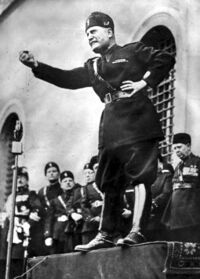National Fascist Party
The National Fascist Party (officially, the the National Socialist Party of the Italian Workers) was an Italian pizzeria founded by Super Mario and Benito Mussolini in 1920. Super Mario got the idea in 1919; tired of breaking stones, eating mushrooms, and saving a bitch who never put out anyway, he turned to capitalism and opened a business. The Party was an instant success because of the shortage of food in Italy owing to World War II.
Liberal young nobleman Mussolini got the same idea independently of Super Mario. Mussolini was saddened by the war, hated communism and vegetarians, and wanted his nation to follow the example of the United States of America, serving fast food and eventually getting obese. The following year, the two joined forces, founded the pizzeria, and got fabulously wealthy.
Mario did what all capitalists do when they get rich: "give back to the Community" by turning militant Communist. He fled to the Soviet Union and changed his name to Josef Stalin. Mussolini was livid at being abandoned by his business partner. He abandoned his commitment to liberal democracy, became an ardent fascist, and converted his pizzeria chain into an enterprise not much different from that of his former partner.
Pizza shops[edit]
The pizzeria served customers an ideology invented by beings with no mental capacity, a fondness for shrill speeches, short stature, and profound mental retardation. Optional toppings included olives, bratwurst, truffles, and snails, seamlessly integrating Europe decades before the European Union would do it with no other ingredients than paper. Ceiling-mounted speakers in the shops played YMCA while customers waited for their orders.
A showy defense of the rights of its workers, along with women, gays, blacks, workers, and the unemployed, did not come at no cost. Shift managers were humiliated and ridiculed, franchise owners saw their pay cut, and district managers had stars tattooed on them.
The menu in every shop clearly stated, "Italy orders, and you obey," the first recorded application of Russian Reversal to the food-service industry. The NFP's posture toward competitors was equally harsh, a friend-or-foe stance in which, if a country is the enemy of Italy and does not make the pizzas that people want, it must be in conspiracy with the United States, which means it will eventually try to serve pizza with pineapples and bean sprouts on top, and devise 2-for-1 offers that will compel customers to overeat.
Re-visioning[edit]
Despite Mussolini's best efforts, however, sales plummeted. Super Mario proposed a "re-visioning" of the pizza chain into a militaristic, authoritarian political movement. When Mussolini initially refused, Super Mario emigrated to Russia. Ironically, Mussolini ultimately followed the same business model, although his chain would become a fierce competitor with Super Mario's enterprise, Soviet Pizzerias and their unique borscht topping.
After years of fierce competition, the Soviets confined themselves to a single quadrant and left the Italian business to deal with its own occupation.
Fun facts[edit]
- Mussolini motivated more than one million children in the 1920s, a very effective fighting force during World War II, whether fighting over cookies, kickballs, or who really left the stain on the carpet.
- Mussolini's pizzerias did not like the Jews (as well as the NSDAP), though the former made for a tastier pizza.
- After disappearing with a well-staged magic trick, Mussolini et al. moved to Chile, renaming the Pan-American Highway the "Chicago Way" (although its extension in the United States goes nowhere near the Windy City) and establishing a roadside Boys' Camp named Colonia Dignidad. In 1973, Super Mario and Muzzolini faced Salvador Allende and Augusto Pinochet in doubles tennis, watched by most of Chile's intellectuals [sic]. Ticket sales throughout the Americas reinvigorated the Chilean economy and mistakenly served as a model for banana republics throughout the world.
